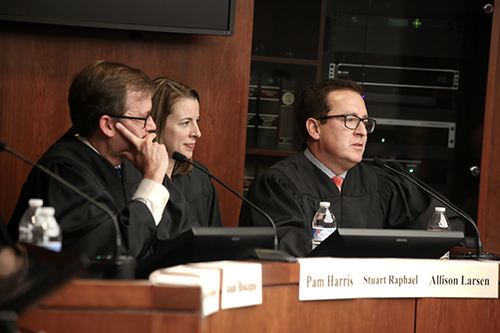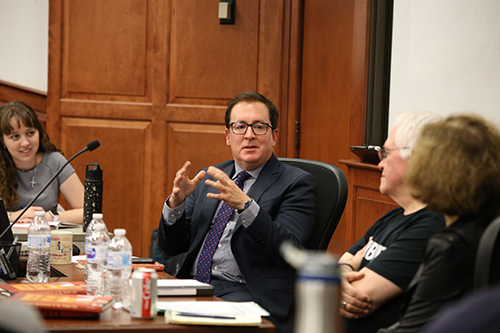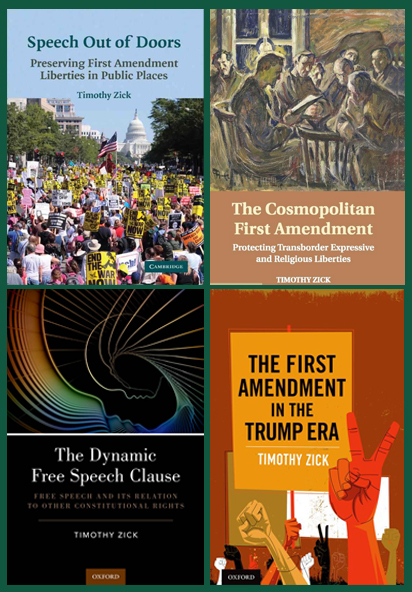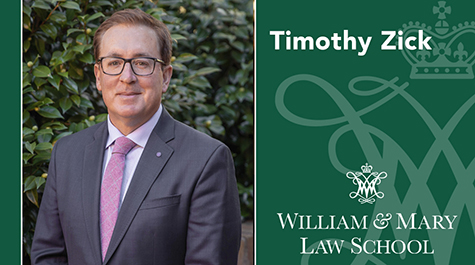William & Mary Law’s Timothy Zick Clarifies the Laws Behind the Headlines
As an expert in constitutional law, Tim Zick never has to wait for new developments in his field, particularly in matters concerning the First and Second Amendments.
Events during the first 15 months of the Covid-19 pandemic, which included the racial justice protests, the November 2020 presidential election and the January 6, 2021 Capitol insurrection, gave him a lot to think about. During this critical period, Zick was quoted in more than two dozen press stories in media including The New York Times, The Atlantic, The Boston Globe, CNN and PolitiFact.
“I really enjoy talking to the press and public about First Amendment and Second Amendment controversies brewing around the nation,” says Zick, the John Marshall Professor of Government and Citizenship and Cabell Research Professor at William & Mary Law School.
Zick has commented on a range of other issues as well. The New York Times has come calling several times since January 2021. Zick’s expertise has brought insight to stories about an extremist group’s attempt to open a church in a Minnesota town (Jan. 15) and several stories about election technology company Dominion’s defamation lawsuit against Fox News (Feb. 4, Feb. 8 and March 25).
Other major news venues include a Boston Globe story involving the Second Amendment (June 16), a FiveThirtyEight piece about the difficulty of stopping the threat of militias (May 18) and a Politifact story asking if the rioters of January 6 could face sedition charges (March 25).
In March, Zick did two radio interviews about the Dominion lawsuit, one with KCBS Radio in San Francisco and the other on The Michael Smerconish Program, which aired on Sirius XM Radio POTUS Channel 124.
In July, Mashable quoted Zick in a story, “Trump’s Baseless Big Tech Lawsuit Is All About Fundraising.” Zick said that the lawsuit “looks like a publicity stunt from a former president who has lost access to social media platforms because he failed to abide by private companies’ terms of service.”
When in-person classes resumed at William & Mary this fall, the calls from media kept coming. In September, the Associated Press sought Zick’s expertise in a story titled “Fake Headline Falsely Suggests Cursing the President Is Illegal.” Later in October, Zick weighed in on the likelihood of presidential incarceration in a Newsweek story, “Donald Trump Can Be Arrested Over Jan. 6 Subpoenas – Here’s Why He Won’t Be.”
In October, too, The Atlantic published an essay Zick cowrote with and Diana Palmer, “The Second Amendment Has Become a Threat to the First: How Firearms Are Having a Documented Chilling Effect on Free Speech.” The story is part of the project “The Battle for the Constitution,” in partnership with the National Constitution Center. Late that month, Zick discussed the essay on MSNBC’s “All In with Chris Hayes."
Most recently, Zick was quoted about the First Amendment threats doctrine in a Reuters Investigative Report titled “Reuters Unmasks Trump Supporters Who Terrified U.S. Election Officials.”
Through it all, Zick has been working on his fifth university press monograph. Forthcoming from Cambridge University Press, Managed Dissent: The Law of Public Protest will provide a critical assessment of how protest and dissent are controlled under various legal and constitutional doctrines.
“Over the past year, I’ve been thinking, writing and commenting on public protest rights, which were so important to the racial justice demonstrations during the summer of 2020,” Zick says. “The book will draw heavily on the demonstrations following the murder of George Floyd, culling lessons from those mass protests about civil rights, civil disobedience, protest policing, armed protests, and other issues.”
Zick also agreed to become a co-author of a First Amendment casebook, The First Amendment: Cases and Theories (4th ed.) and looks forward to editing and using the book in future free speech classes.
Zick’s previous books include Speech Out of Doors: Preserving First Amendment Liberties in Public Places (Cambridge UP, 2009), The Cosmopolitan First Amendment: Protecting Transborder Expressive and Religious Liberties (Cambridge UP, 2014), The Dynamic Free Speech Clause: Freedom of Speech and Its Relation to Other Constitutional Rights (Oxford UP, 2018) and The First Amendment in the Trump Era (Oxford UP, 2019) (recently translated into Japanese).
Keeping his plate more that full, Zick has also continued to publish articles for law journals, including “The Costs of Dissent: Protest and Civil Liabilities, George Washington Law Review (2021) (read more) and “Framing the Second Amendment: Gun Rights, Civil Rights and Civil Liberties,” Iowa Law Review (2020) (read more).
From April 29 to May 1, Zick attended (virtually) the Free Expression Scholars Conference, hosted by Yale Law School and the Floyd Abrams Institute for Freedom of Expression. There he presented an early draft chapter from Managed Dissent.
Zick’s extensive research has also impacted his teaching, leading to the creation of a new course.
“I taught a seminar on Second Amendment law and policy for the first time this past spring,” Zick says. “I learned a lot from the students and look forward to teaching the course in the future.” The seminar explored various areas of law and policy relating to firearms, including the right to carry firearms in public, the rights of felons, and the effects of open carry of firearms on protest rights.
The combination of precise researcher, thinker, teacher and public intellectual has not gone unnoticed. At William & Mary, Zick received the Plumeri Award for Faculty Excellence in 2011, 2013 and 2017. More recently, he was appointed the William H. Cabell Research Professor for the 2021-22 academic year. The distinguished one-year professorship is funded by the Cabell Foundation of Richmond, which was established in 1957 by Robert G. Cabell III and Maude Morgan Cabell. This is Zick’s second Cabell professorship.
Zick graduated summa cum laude from Indiana University and summa cum laude from Georgetown University Law Center, where he received the Francis E. Lucey, S.J. Award for graduating first in his class. While at Georgetown, he was a Notes and Comments editor of the Georgetown Law Journal. Following law school, he was an associate with the law firms of Williams and Connolly in Washington, D.C., where he assisted in the defense of congressional term limits in the Supreme Court of the United States, and Foley Hoag in Boston.
Zick served as a law clerk to the Honorable Levin H. Campbell of the United States Court of Appeals for the First Circuit. He also served as a Trial Attorney in the Federal Programs Branch of the United States Department of Justice, where he defended the constitutionality and legality of a variety of federal programs and statutes.
Zick enjoys his specialties of study because of their timeliness and relevance as they inform events ripped directly from each day’s headlines. He brings his expertise to bear in a variety of ways.
“Writing books and articles is rewarding work,” Zick says. “It’s always gratifying when others publish your comments and cite your scholarship. But I also try to influence law and policy in other ways, like testifying before a congressional subcommittee about the Occupy Wall Street movement and incorporating scholarly arguments into Supreme Court briefs in First Amendment and Second Amendment cases.”
Learn more about Professor Zick.
About William & Mary Law School
Thomas Jefferson founded William & Mary Law School in 1779 to train leaders for the new nation. Now in its third century, America’s first law school continues its historic mission of educating citizen lawyers who are prepared both to lead and to serve.
